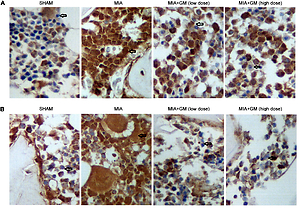Current issue
Archive
Manuscripts accepted
About the Journal
Editorial office
Editorial board
Section Editors
Abstracting and indexing
Subscription
Contact
Ethical standards and procedures
Most read articles
Instructions for authors
Article Processing Charge (APC)
Regulations of paying article processing charge (APC)
ORTHOPEDICS AND TRAUMATOLOGY / RESEARCH PAPER
Gentiana macrophylla exhibits a potential therapeutic effect on osteoarthritis (OA) via modulating disease-related proteins
1
Shuguang Hospital Affiliated to Shanghai University of Traditional Chinese Medicine, China
Submission date: 2020-10-17
Final revision date: 2021-04-16
Acceptance date: 2021-05-09
Online publication date: 2021-05-22
Corresponding author
Yuxin Zheng
Shuguang Hospital Affiliated to Shanghai University of Traditional Chinese Medicine, China
Shuguang Hospital Affiliated to Shanghai University of Traditional Chinese Medicine, China
KEYWORDS
TOPICS
ABSTRACT
Introduction:
Prostaglandin E2 (PGE2) has been reported to cause cartilage degradation in the pathogenesis of osteoarthritis (OA). Matrix metallopeptidases (MMPs) play important roles in the pathogenesis of OA, while p-AKT and p-P39 signaling pathways were reported to be activated in the pathogenesis of OA. In this study, we aimed to investigate the effect of Gentiana macrophylla (GM) on the treatment of OA.
Material and methods:
Primary rat chondrocytes were treated with PBS, IL-1β, and IL-1β+GM respectively to established in vitro models, and in vivo models were set up as a SHAM group, a monoiodoacetic acid (MIA) group, a MIA+GM (low dose) group and a MIA+GM (high dose) group.
Results:
In primary rat chondrocytes, the IL-1β treatment elevated the expression of PGE2 and COX2 mRNA. However, the GM treatment reduced the expression of PGE2 mRNA and COX2 mRNA. Also, the GM treatment reduced the expression of above MMPs in primary rat chondrocytes treated with IL-1β. Moreover, unlike P38 and AKT, GM treatment could reduce the expression of p-P38 and p-AKT in primary rat chondrocytes treated with IL-1β. Also, GM treatment reduced the up-regulated expression of COX2, MMPs including MMP-1, MMP-3 and MMP-13, and p-P38 and p-AKT in OA rat models, thus exhibiting a therapeutic effect on OA pathology.
Conclusions:
Our study demonstrated the inhibitory effect of GM on the up-regulated expression of PGE2, Cyclooxygenase-2 (COX-2), MMPs including MMP-1, MMP-3 and MMP-13, AKT and P38 in OA models, thus verifying the therapeutic effect of GM on the treatment of OA.
Prostaglandin E2 (PGE2) has been reported to cause cartilage degradation in the pathogenesis of osteoarthritis (OA). Matrix metallopeptidases (MMPs) play important roles in the pathogenesis of OA, while p-AKT and p-P39 signaling pathways were reported to be activated in the pathogenesis of OA. In this study, we aimed to investigate the effect of Gentiana macrophylla (GM) on the treatment of OA.
Material and methods:
Primary rat chondrocytes were treated with PBS, IL-1β, and IL-1β+GM respectively to established in vitro models, and in vivo models were set up as a SHAM group, a monoiodoacetic acid (MIA) group, a MIA+GM (low dose) group and a MIA+GM (high dose) group.
Results:
In primary rat chondrocytes, the IL-1β treatment elevated the expression of PGE2 and COX2 mRNA. However, the GM treatment reduced the expression of PGE2 mRNA and COX2 mRNA. Also, the GM treatment reduced the expression of above MMPs in primary rat chondrocytes treated with IL-1β. Moreover, unlike P38 and AKT, GM treatment could reduce the expression of p-P38 and p-AKT in primary rat chondrocytes treated with IL-1β. Also, GM treatment reduced the up-regulated expression of COX2, MMPs including MMP-1, MMP-3 and MMP-13, and p-P38 and p-AKT in OA rat models, thus exhibiting a therapeutic effect on OA pathology.
Conclusions:
Our study demonstrated the inhibitory effect of GM on the up-regulated expression of PGE2, Cyclooxygenase-2 (COX-2), MMPs including MMP-1, MMP-3 and MMP-13, AKT and P38 in OA models, thus verifying the therapeutic effect of GM on the treatment of OA.
Share
RELATED ARTICLE
We process personal data collected when visiting the website. The function of obtaining information about users and their behavior is carried out by voluntarily entered information in forms and saving cookies in end devices. Data, including cookies, are used to provide services, improve the user experience and to analyze the traffic in accordance with the Privacy policy. Data are also collected and processed by Google Analytics tool (more).
You can change cookies settings in your browser. Restricted use of cookies in the browser configuration may affect some functionalities of the website.
You can change cookies settings in your browser. Restricted use of cookies in the browser configuration may affect some functionalities of the website.



